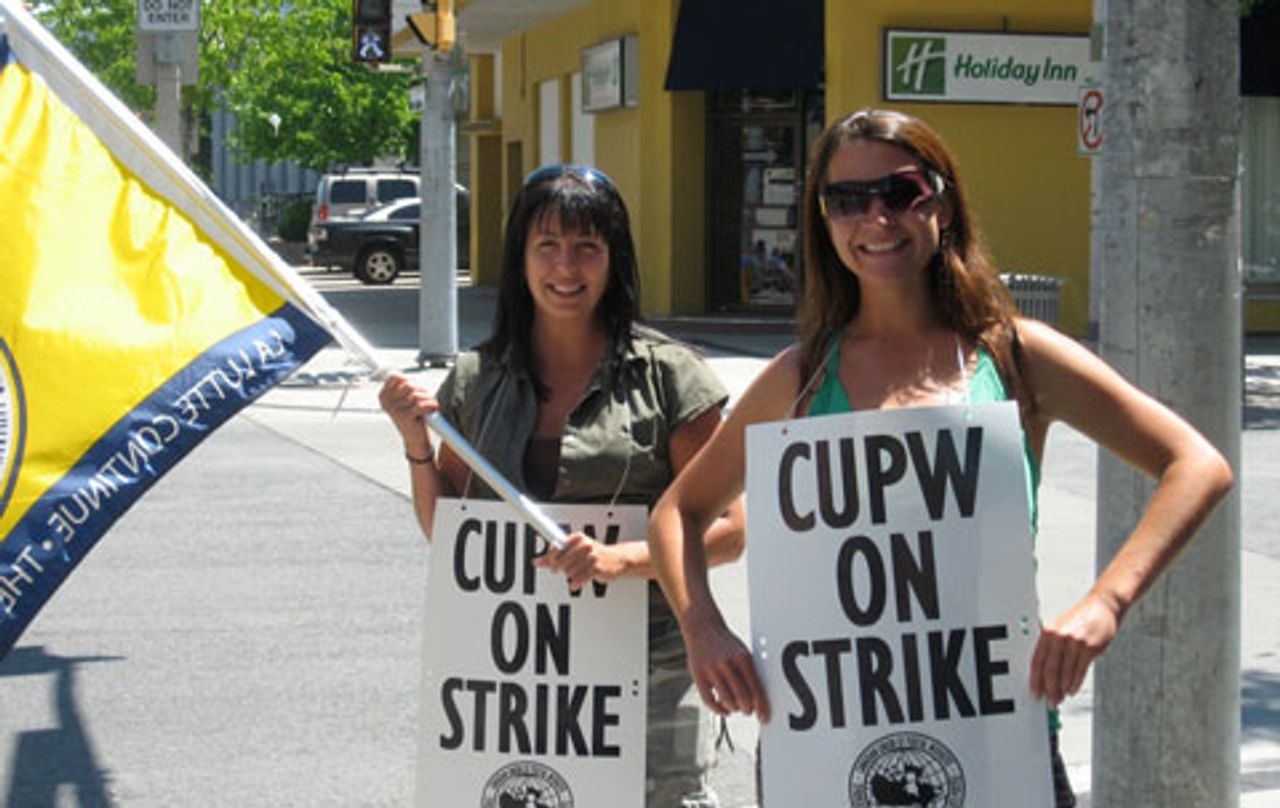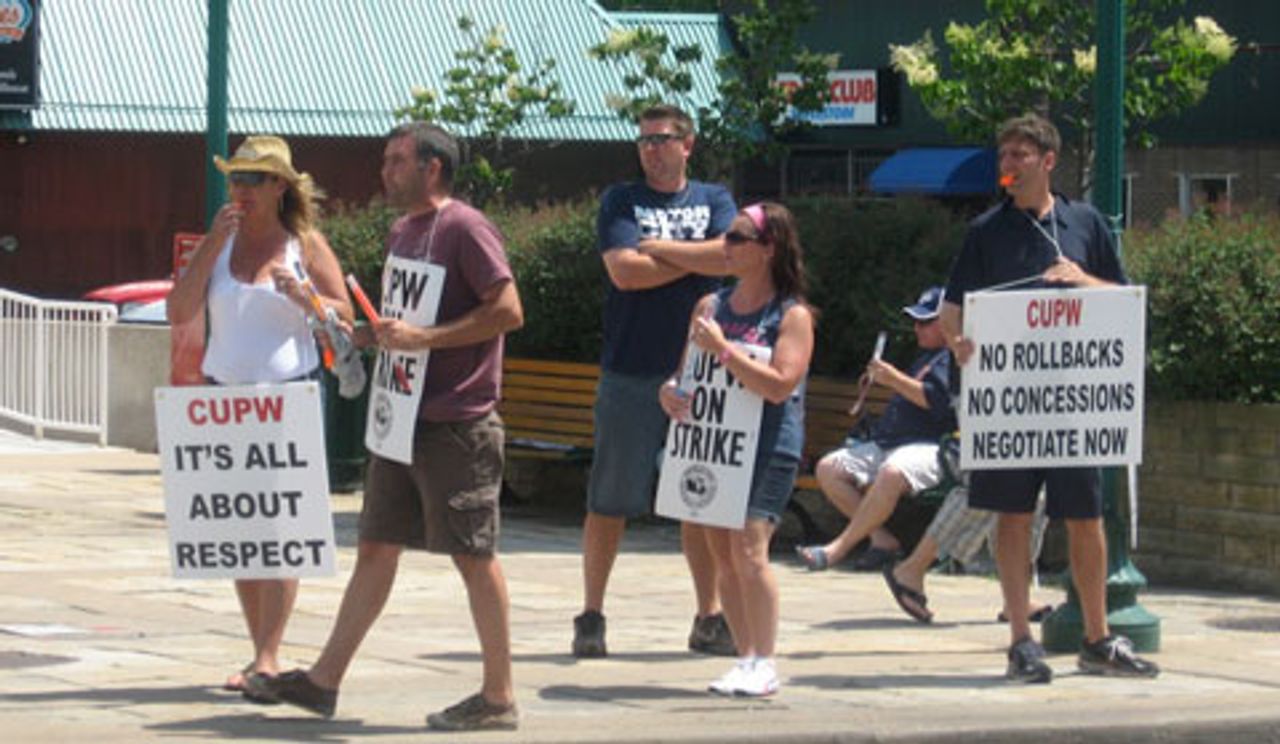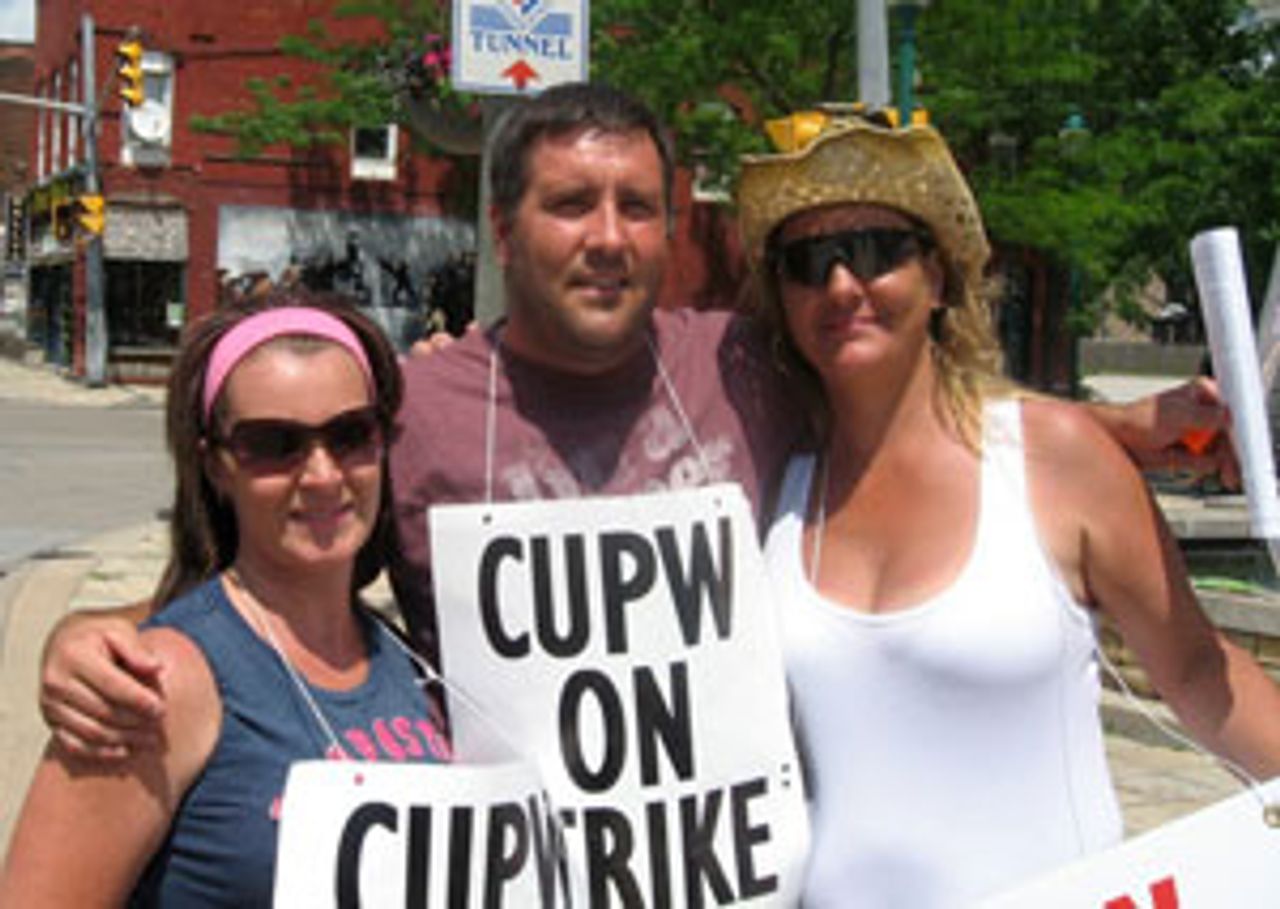The Canadian Union of Postal Workers (CUPW) continued its policy of rotating strikes with one-day walkouts in 10 cities on Monday. CUPW has called the series of rotating strikes in an attempt to defuse demands for a nationwide walkout, which would pose a direct confrontation with the government of Prime Minister Stephen Harper.
 Pickets, downtown Windsor Post Office
Pickets, downtown Windsor Post OfficeIn response, Canada Post has imposed a partial lockout of 48,000 letter carriers, postal station clerks, mail sorters and letter carriers. Letter carriers are being reduced to a three-day workweek: Monday, Wednesday and Friday. Other Canada Post employees are also having their hours reduced. All temporary and casual employees have been placed on indefinite layoff.
In a further provocation, management last week suspended benefits for its unionized urban employees, including curtailing medical and drug allowances for disabled employees.
Management is demanding sweeping concessions, including a 20 percent reduction in the starting pay for new employees, cuts to sick benefits, changes in work rules, the elimination of jobs through mechanization and implementation of a hazardous new mail sorting system.
A CUPW press release Monday issued in response to the latest provocations of Canada Post accused management of “aggressively trying to force postal workers out on a full-scale national strike in order to secure back-to-work legislation from the majority Conservative government.”
 Pickets at the Sandwich Post Office
Pickets at the Sandwich Post OfficeThe union repeated its offer to suspend strike action if management will agree to reinstate the previous contract. However, management has indicated that it is determined to impose an historic defeat on postal workers that will set a precedent for wage cutting across Canada.
The cities impacted by Monday’s job actions included Cape Breton, Nova Scotia; Fredericton, New Brunswick; Mauricie and Sherbrooke, Quebec; Corner Brook, Newfoundland Labrador; Cornwall, Windsor and Niagara Falls, Ontario; Regina, Saskatchewan and Nanaimo, British Columbia. Over the past two weeks rotating strikes have also hit Calgary, Edmonton, Montreal, Winnipeg and other cities.
The World Socialist Web Site spoke to Canada Post workers on the picket line in Windsor Monday about the issues in their struggle. Several picket captains said they had gotten instructions from local CUPW officials not to talk to the media. However, others agreed to be interviewed by the WSWS.
 Bonnie Ford
Bonnie FordBonnie Ford said, “I am a letter carrier, I am also on the health and safety committee here.
“A lot of people here, even if they work full time, have another job. It’s hard.
“When I started I thought I would retire from here. Now that things are being taken away I think, ‘Did I make a mistake, should I have stayed in school?’”
She said she opposed the demand by Canada Post for a lower starting wage for new employees.
“In my opinion, years down the road there will be more casual or temporary workers than the older senior employees. Then the company can say, ‘You old employees, we are going to knock your wage down $6 an hour and give the new guys a $2 an hour raise so that you are more equal.’ It may not affect me now, but maybe in 10-15 years it will.
“Plus it creates a lot of stress and animosity among the employees. You don’t want to come to work like that.”
She commented on the two-tier wage accepted by the US United Auto Workers in 2007 that slashed pay for new hires by 50 per cent. “In my opinion it will backfire on the senior employees. At some point the senior employees will be given a contract where they have to take a pay cut. I would do that too if I were the head of a corporation, it is a good way to save some money. Is it fair? I don’t think so.”
Bonnie talked about the proposed cut in sick leave benefits. “Senior members have banked time and accumulated hundreds of sick days which the company wants to buy out for a minimal amount of money. You are then left with seven personal days, which they can then refuse.
“Seven days doesn’t cut it. That’s a big issue for me. It’s not about having a lot of days to go to the beach. People get sick. There is a lot of dirty mail. There are things people come in contact with. To say you are only going to get seven days is hard. Look at the H1N1. People were quarantined for five days. They are only going to get two days for the entire year? That’s not fair.
“We are just one of the public service industries that is facing this right now. Air Canada is going on strike. In the past we have kind of set the standard. On maternity leave we were part of that.
“There is nothing wrong with being fair. When you are working for a company that is doing extremely well it isn’t fair to have cutbacks of what you have already fought for. That should be the standard everywhere. We should be treated fairly.
“I think if the public knew a lot more of what is going on instead of what the media is telling them they would be more sympathetic and understanding with our issues. It’s not just us, it’s everywhere.”
 Jeff Denomme (center)
Jeff Denomme (center)Jeff Denomme said, “This strike isn’t about wages. We don’t want what we have taken away from us. I don’t want a wage increase. I want to keep my pension and all the other benefits that we have.”
The striker explained changes in sick leave being demanded by management. “We accumulate 10 sick hours a month. If I have been there for, say, 17 years I have all those sick days accumulated. With this benefit it is just like a sick day, it kicks in right away. They want to take that away. They want to give us seven days and then at that point you deal with Med Life.
“Harper wants to privatize. Just like the city workers here who got all their things taken away. We have to fight for what we got. I hope that we win in the end.”
Commenting on the proposed change to sick leave, another Windsor postal worker said, “Now it is up to them if I can take my personal days. And they can refuse me. So I can either come to work sick if I can’t afford to stay at home or be at home without pay. It’s their decision.”
